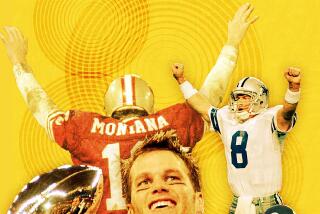Williams Says Walls of Racial Prejudice Falling Very Slowly
- Share via
STEVENS POINT, Wis. — It’s been more than seven years since Doug Williams became the first black quarterback to win a Super Bowl. But the walls of racial prejudice are slow to fall.
Sure, there are more black quarterbacks in the NFL than before. Warren Moon starts in Minnesota, Jeff Blake in Cincinnati and Randall Cunningham in Philadelphia, while Steve McNair is being groomed to take over in Houston.
But the NFL Williams sees today isn’t much different than the one he proved wrong in the 1988 Super Bowl, when he earned the MVP award by throwing for 340 yards and four touchdowns in the Redskins’ romp over Denver.
“Just because I won a Super Bowl don’t mean the league is going to change,” said Williams, 40, a scout for the expansion Jacksonville Jaguars. “There’s an awful lot of young black quarterbacks who are out there and could be in some of those second and third slots and on some practice squads. But they have to do better or just about as well as anybody else or they won’t get that chance.”
Williams believes that if a black quarterback isn’t good enough to be a starter, most teams will shy away and sign up a couple of whites as backups. Rodney Peete is that rare exception, and former Heisman Trophy winner Andre Ware hopes to be as he competes for a backup job with the Jaguars.
“I’m not just talking about the guy who starts,” Williams said. “I’m talking about the guys who are backups, the guys who are on the practice squad. Let them get some of the work, too. Let them get paid some of this money.”
Williams can hold himself up as proof that a double-standard exists. When he retired as a player two years after his Super Bowl triumph, he didn’t exactly find NFL people knocking at his door in Zachary, La. He started out his coaching career in the high school ranks, moved to the Naval Academy in 1994 as a running backs coach, and was hired by the Jaguars at the beginning of the year.
“Let me put it this way: The same route I took to get to the Super Bowl, I took that same route to get where I am now,” he said. “That was nothing different, no change, so it wasn’t surprising to me. That’s how I have to look at it.
“I don’t think you could find one other guy who played in the Super Bowl and won the MVP who ever coached in high school. I could be wrong, but I don’t know of anybody.”
But he insists he’s not bitter about taking the long road back to the NFL.
“Life isn’t fair,” Williams said with a shrug. “A lot of things have been afforded to people that haven’t been in my position that haven’t been afforded to me. I know that. But should I not go to bed at night? Should I stay up and worry about it all night? Should I jump off the Mississippi River bridge because of it? No. No. Life goes on regardless of what happens to me or anybody else.”
Williams chose to put a positive spin on life’s injustices. He says his greatest moment in football wasn’t winning the Super Bowl but leading his alma mater, Northeast High School, to a 13-1 record and a spot in the Louisiana state semifinals in 1993.
“I was coaching at a high school I graduated from, in front of my family and friends, on the same field I played on and the field that it now named for me,” Williams said. “That’s the best time I’ve ever had being around football.”
Williams spent the summer as the offensive coordinator for the Scottish Claymores of the World League, which he hoped would land him a head coaching position in the college ranks. But his brief tenure as a Jaguars scout has given him a new perspective on his career.
“I’ve always wanted to coach at the college level, and I still do. Now I’m caught in between being a head coach in college or the personnel side of professional football.
“I think this is interesting. You get a chance to go to a lot of colleges, go to a lot of places and see a lot of football games in college. That’s exciting. You get to a put a grade on players, try to judge whether they can play. You get to look for the sleepers out there and say, ‘Hey, we need to give this kid a chance.’ That makes you feel good.”
And nothing would please Williams more than finding a few more NFL jobs for black quarterbacks.
More to Read
Go beyond the scoreboard
Get the latest on L.A.'s teams in the daily Sports Report newsletter.
You may occasionally receive promotional content from the Los Angeles Times.










